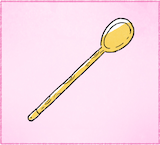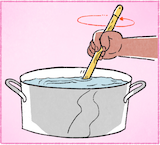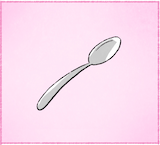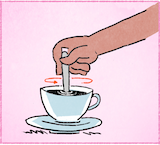



นี้คืออี่หยัง นี้คือทัพพี
ทัพพีเป็นแบบใด ทัพพีเป็นค้ายๆ กับซ้อน แต่ว่ามันอันใหญ่ เอาไว้ถ้าเฮ็ดแนวกิน
ทัพพีเฮ็ดมาจากอี่หยัง ทัพพีเฮ็ดมาจากไม้กะได้ ทัพพีเฮ็ดมาจากพะสะติกกะได้ ทัพพีเฮ็ดมาจากเหล็กกะได้
ทัพพีเฮ็ดจากหลายสิ่งหลายอย่าง เพาะว่าขั้นเฮ็ดมาแล้ว ต้องทนความฮ้อนได้พ้อม ทนความฮ้อนเพื่อที่สิเฮ็ดแนวกินได้โดน
ทัพพีเอาไว้เฮ็ดหญังแน่ เอาไว้เฮ็ดแนวกิน เอาไว้คนแนวกิน คนอยู่ในหม้อกะได้ คนอยู่ในถ้วยกะได้
ทัพพีมันแพงบ่ บ่ ทัพพีมันบ่แพงดอก มันบ่แพงเลย ลาคาถืกๆ หนึ่ง สามาดไปหาซื้ออยู่ในตะหลาดกะได้ ซื้ออยู่ในห้างกะได้ หาซื้อได้ง่ายๆ หนึ่ง
13
เขากำลังเฮ็ดหญัง เขากำลังคนแนวกิน หลือคนน้ำอยู่ในหม้อ
เขาใซ้อี่หยังคน เขาใซ้ทัพพีคนแม่นบ่ แม่น เขาใซ้ทัพพีคนอยู่ในหม้อ ทัพพีด้ามสีเหลียง เขากำลังคนแนวกินอยู่ในหม้ออยู่
หม้อใบใหญ่บ่ ใบใหญ่อยู่
มีน้ำอยู่ในหม้อ น้ำเกียบเต็มหม้อเอาโลด เขากำลังใซ้ทัพพีคน
จักเขาสิต้มน้ำนี้ไว้เฮ็ดหญัง อาดสิเฮ็ดน้ำหวาน หลือสิเฮ็ดแนวกินกะได้
14
นี้คืออี่หยัง นี้คือซ้อน หลือซ้อนซา เอาไว้ถ้ากินกาแฟ หลือเอาไว้ถ้ากินนม หลือเอาไว้ถ้าป้อนเข้าเด็กน้อย
ซ้อนซาเฮ็ดมาจากอี่หยัง ซ้อนซาเฮ็ดมาจากเหล็กกะได้ เฮ็ดมาจากพะสะติกกะได้ เฮ็ดมาจากไม้กะได้ เฮ็ดมาจากหลายสิ่งหลายอย่าง
ซ้อนซาซื้อได้อยู่ใสแน่ ซื้ออยู่ตะหลาดกะได้ ซื้ออยู่ในห้างกะได้ ซื้ออยู่ในโลตั่ดกะได้ สามาดซื้อได้หลายหม้อง
15
เขากำลังเฮ็ดหญัง เขากำลังคนกาแฟ เขาใซ้ซ้อนคนกาแฟอยู่ในถ้วยกาแฟ
ถ้วยกาแฟนี้มีจานฮองกาแฟพ้อม
ตอนนี้เขากำลังคนกาแฟ เขาใซ้ซ้อนคนกาแฟอยู่ เขาอาดสิใส่น้ำตานลงไป แล้วเขากะคน อาดสิเฮ็ดให้น้ำตานละลายกะได้
เป็นหญังเขาคือคนกาแฟ เขาอาดสิกินกาแฟ เขากะเลยสิคนกาแฟ หลือเฮ็ดให้มันบ่ฮ้อนกะได้
Link to overview page
Link to dictionary
| Isaan | Pronunciation | Tones | Thai | English/Notes |
|---|---|---|---|---|
| นี้ | ni: | HF | นี้ | 1. this 2. here |
| คือ | khʉ: | HR | คือ | 1. to be, to resemble, like, as 2. why {บักหล้าคือบ่เก็บโต่ะแน่ = [addressing a young boy] Why haven't you cleared the table?} |
| อี่หยัง | i:-yaŋ | H-M | อะไร | 1. what {นี้คืออี่หยัง = What is this?} {มื้อนี้เจ้าเฮ็ดอี่หยัง = What are you doing today?} {กินเข้างายกับอี่หยัง = What did you have for breakfast?} 2. something, anything, (in negations) nothing {บ่ต้องเฮ็ดอี่หยังอีกเลยนอกจากใส่ปุย = [we] don't need to do anything besides adding fertilizer} |
| ทัพพี | thap-phi: | H-HR | ทัพพี | ladle |
| เป็น | pen | M | เป็น | 1. to be, to exist 2. to be able to 3. to suffer, sth. happens to 4. เป็นหญัง[...]คือ in initial position: why? {เป็นหญังเขากะคือแปงฟัน = Why is he brushing his teeth?} {เป็นหญังเคี่ยงบินมันคือสิตก = Why is the airplane falling down?} |
| แบบ | bɛ:p | LF | แบบ | 1. example, model, kind 2. style, form, pattern, design |
| ใด | dai | M | ใด | 1. which, that one which, what, how {เขานั่งแบบใด เขานั่งขดตะหมาดอยู่ = How is he sitting? He's sitting cross-legged.} {ตอนใด = when?} 2. whichever, whoever {หม้องใดหม้องหนึ่ง = some place, somewhere} {ขั้นเฮาอยากตื่นญามใด เฮากะตั้งเวลาปุกญามนั้น = If we want to get up at a certain time, we set the alarm to that time} Notes: sentence-final often with a marked rising tone |
| ค้าย | kha:i | HF | คล้าย | to resemble, to be similar, to be alike {ทัพพีเป็นค้ายๆ กับซ้อน = a ladle is similar to a spoon} |
| กับ | gap | M | กับ | 1. and {ลุงกับป้า = uncle and aunt} {กวยเตียวหมูกับกวยเตียวไก่ = noodle soup with pork and noodle soup with chicken} 2. with, to {ค้ายๆ กับคำว่า ... = similar to the word ...} 3. prefix in front of foods {กับเข้า = side dishes eaten with rice} {เขากินกับกวยเตียว = he's eating noodle soup} |
| ซ้อน | sɔ:n | HF | ช้อน | spoon {เขาใซ้ซ้อนคนกาแฟ = he's stirring the coffee with a spoon} |
| แต่ว่า | tɛ:-wa: | H-H | แต่ว่า | 1. but 2. only {ฮู้แต่ว่าเขายืนอยู่พุเดียว = I only know that he's standing there by himself} |
| มัน | man | HR | มัน | it (also used to refer to people) |
| อัน | an | M | อัน | 1. thing, object 2. general clf. for objects |
| ใหญ่ | ɲai | H | ใหญ่ | large, big |
| เอา | ao | M | เอา | to take, to give {เขากำลังเอาก่องไปซั่ง = he's taking the boxes to weigh them} {หมอกำลังเอายาให้คนป่วยกิน = the doctor is giving medicine to the patient} {เอาไว้ถ้า = is for, is used for, has the purpose of} |
| ไว้ถ้า | wai-tha: | HF-LF | usually in a positive statement or answer: is for, is used for, has the purpose of {กะทะมีไว้ถ้าทอด = a pan is for frying} {น้ำบักนาวมีไว้ถ้าปุงอาหาน = lime juice is used to season food} {ปากกามีไว้ถ้าเขียน = a pen is for writing} {กะเทียมเอาไว้ถ้าเฮ็ดแนวกิน = garlic is used to make food} {ขาเอาไว้ถ้าญ่าง = legs are for walking} {เกิบเอาไว้ถ้าใส่ = shoes are for wearing} Notes: see also ไว้ |
|
| เฮ็ด | het | H | ทำ | to do, to make |
| แนวกิน | nɛ:o-gin | HR-M | อาหาร | food {เฮ็ดแนวกิน = to prepare food} {ตำบักหุ่งเนี้ยกะสิเป็นแนวกิน = papaya salad is (a kind of) food} |
| มา | ma: | HR | มา | 1. to come 2. auxiliary expressing action towards the present or focal time {กะคุเฮ็ดมาจากอี่หยัง = What is the bucket made of?} {แล้วเขากะเก็บเงินจากพุนั้นมา = and then she takes the money of that person} |
| จาก | ja:k | LF | จาก | 1. from {... เฮ็ดมาจากอี่หยัง = ... is made from what?} 2. to depart |
| ไม้ | mai | HF | ไม้ | wood, tree |
| กะ | ga | M | ก็ | 1. then, consequently 2. also |
| ได้ | dai | HF | ได้ | 1. can 2. to get, to obtain 3. before verb: indicating past tense 4. บ่ได้ + verb: not |
| พะสะติก | pha-sa-tik | H-M-M | พลาสติก | plastic |
| เหล็ก | lek | M | เหล็ก | iron, steel, metal |
| หลายสิ่งหลายอย่าง | la:i-siŋ-la:i-ya:ŋ | M-H-M-H | หลากหลาย, มากมาย, หลายอย่าง | varied, various, several (kinds etc.) |
| เพาะว่า | phɔ-wa: | H-H | เพราะว่า | because |
| ขั้น | khan | LF | เมื่อ | when, if |
| แล้ว | lɛ:o | HF | แล้ว | 1. finished 2. already 3. and then, and next (especially แล้วกะ) 4. auxiliary for past tense |
| ต้อง | tɔŋ | HF | ต้อง | to have to, must |
| ทน | thon | HR | ทน | to last, to resist, to withstand, to endure, to tolerate, to bear |
| ความฮ้อน | khwa:m-hɔ:n | HR-HF | ความร้อน | heat Notes: pronunciation: also realized as ความล้อน |
| พ้อม | phɔ:m | HF | พร้อม | at the same time, also, too {มีตะเว็นพ้อม = the sun's out, too} {กะทะมีด้ามพ้อม = the pan has also a handle} |
| เพื่อที่ | phʉ:a-thi: | H-H | เพื่อที่ | in order to, so that Notes: the vowel เอือ is likely to be a Thai loan |
| สิ | si | M | จะ | future tense auxiliary {เขากำลังสิตื่น = he's about to wake up} {สิไปตะหลาด = [I'm] going to the market} |
| โดน | do:n | M | นาน | time: long |
| ไว้ | wai | HF | ไว้ | 1. to keep, to put, to place, to retain, to save, to reserve {เขาเอาหัวของเขาไว้ใส = Where does she put her head?} {หมาสิเลี้ยงไว้บ้าน = dogs are kept/raised in the house} {ไก่เลี้ยงไว้ในคอก = chicken are kept/raised in a coop} {หน้ามันบังไว้ = the face is covered/not visible} {เขาเอาโทละสับวางไว้หู = he holds the phone to his ear} 2. for {นาลิกาปุกมีไว้เฮ็ดหญัง = What is an alarm clock for?} {หม้อเอาไว้เฮ็ดแนวกิน = a pot is used to make food} {ก่องเอาไว้เฮ็ดหญัง ก่องเอาไว้ใส่ของ = What is the box for? It's for putting in stuff.} Notes: see also ไว้ถ้า |
| หญัง | ɲaŋ | M | อะไร, เป็นหญัง = ทำไม | 1. what {เขากำลังเฮ็ดหญัง = What is he doing?} {ธูปเอาไว้เฮ็ดหญัง = What are incense sticks for?} 2. something, anything, (nothing) 3. เป็นหญัง[...]คือ in initial position: why {เป็นหญังเขาคือใส่บักพิกลงไปในกวยเตียว = Why is he putting chili in [his] noodle soup?} {เป็นหญังหน้าต่างมันคือเปิด = Why is the window open?} {เป็นหญังมันคือมีควนไฟ = Why is there smoke?} |
| แน่ | nɛ: | H | แน่, บ้าง | 1. some, somewhat 2. final particle, used to ask for examples (similar to Thai บ้าง at the end of a question) {หม้อใซ้เฮ็ดอี่หยังได้แน่ = What (different things) can a pot be used for?} {น้ำอัดลมซื้อได้อยู่ใสแน่ = Where/in which places can one buy soft drinks?} 3. final particle, when giving examples {มีเทิงส้งแน่ มีเสี้ยแน่ มีเกิบแน่ = there are trousers, shirts, shoes etc.} 4. final particle, used to give a command {ไปปิดหน้าต่างให้แน่ = Close the window!} 5. final particle, acting as an intensifier, especially in the pattern ... คัก ... แน่ {สูงคักสูงแน่ = very high} {ญ้องเฮาคัก ญ้องเฮาแน่ = [he's] praising me a lot} |
| คน | khon | HR | คน | to stir {เขาใซ้ทัพพีคนแนวกิน = he's stirring the food with a ladle} |
| อยู่ | yu: | H | อยู่ | 1. to be (located) at 2. yet, still 3. auxiliary indicating continuous or progressive action {ทอดปาอยู่ในกะทะ = (in the process of) frying a fish in the pan} {แม่กำลังเมี้ยนเฮียนอยู่ = mother is cleaning/tidying up the house} |
| ใน | nai | HR | ใน | in, within |
| หม้อ | mɔ: | LF | หม้อ | pot |
| ถ้วย | thu:ai | LF | ถ้วย | small bowl |
| แพง | phɛ:ŋ | HR | แพง | 1. expensive 2. dear |
| บ่ | bɔ: | H | ไม่ | 1. no, not 2. question particle, transforming a statement into a question Notes: spelling exception in line with common usage on social media |
| ดอก | dɔ:k | LF | หรอก, ดอก | 1. particle used after a negative, relativizing or explanatory statement to make the sense milder {กินเข้าบ่ บ่กินดอก = Are you going to eat [with us]? No.} {เป็นก้อนสี่เหลี่ยม ก้อนน้อยๆ ดอก = These are cubes, small cubes.} {แล้วกะมีลดคันหนึ่งขี่ผ่านมา เป็นลดเก็งดอก = And there's a car passing, a sedan.} 2. particle used to emphasize (not necessarily a negative) contrast 3. particle used for emphasis {ดอกไม้นี้งามบ่ กะงามอยู่ เบิ่งงามๆ ดอก = Is this flower beautiful? Yes, it's beautiful, it looks beautiful} |
| เลย | lə:i | HR | เลย | 1. futher on, beyond, past {เข็มน้อยเลยเลขสิบสองไป = the minute hand has passed number twelve} 2. too much 3. at all 4. definitively 5. completely, utterly |
| ลาคา | la:-kha: | HR-HR | ราคา | price |
| ถืก | thʉ:k | LF | ถูก | cheap, inexpensive |
| หนึ่ง | nʉŋ | H | หนึ่ง | 1. one 2. after adjective: intensifier {บักคักหนึ่ง = very much} {อันบักใหญ่หนึ่ง = very large}, or attenuates the meaning {กะดาดมันแผ่นน้อยๆ หนึ่ง = the piece of paper is [relatively] small} |
| สามาด | sa:-ma:t | M-HF | สามารถ | can, to be able |
| ไป | pai | M | ไป | 1. to go 2. auxiliary indicating action extending into the future |
| หา | ha: | M | หา | to look for, to find |
| ซื้อ | sʉ: | HF | ซื้อ | to buy |
| ตะหลาด | ta-la:t | M-LF | ตลาด | market |
| ห้าง | ha:ŋ | LF | ห้าง | shop, shopping mall |
| ง่าย | ŋa:i | H | ง่าย | easy, simple, clear |
| เขา | khao | M | เขา | personal pronoun: he, she |
| กำลัง | gam-laŋ | M-HR | กำลัง | auxiliary indicating continuous or progressive action |
| หลือ | lʉ: | M | หรือ | or |
| น้ำ | na:m | HF | น้ำ | 1. water 2. drink, soft drink, juice |
| ใซ้ | sai | HF | ใช้ | to use |
| แม่นบ่ | mɛ:n-bɔ: | H-H | ใช่ไหม | question particle: ..., right? ..., isn't it? ..., don't you? etc. {เจ้าได้เห็นสิ่งนั้นแม่นบ่ = You've seen that, haven't you?} {ฝนกำลังตกแม่นบ่ = It's raining, isn't it?} {นี้คือกะคุแม่นบ่ = This is a bucket, isn't it?} |
| แม่น | mɛ:n | H | ใช่ | 1. yes 2. affirmative particle |
| ด้าม | da:m | HF | ด้าม | handle |
| สี | si: | M | สี | 1. color 2. colored pencil, crayon |
| เหลียง | li:aŋ | M | เหลือง | yellow |
| ใบ | bai | M | ใบ | 1. leaf {ต้นไม้มีใบสีเขียว = the tree has green leaves} 2. banknote {เทิงมีใบพ้อม เทิงมีเหลียนพ้อม = there are notes as well as coins} 3. clf. for leaves, bank notes, helmets, bowls, jars, pots, boxes {ใบบัว = lotus leaf} {ก่องใบน้อย = a small box} {หม้อใบนี้มีฝาพ้อม = the pot here has a lid, too} {ถ้วยใบสีแดง = a red bowl} |
| มี | mi: | HR | มี | 1. to have 2. there is |
| เกียบ | gi:ap | LF | เกือบ | nearly, almost |
| เต็ม | tem | M | เต็ม | full |
| เอาโลด | ao-lo:t | M-HF | เอาเลย, ทำเลย, จริงๆ | in final position: intensifier {โตส่ำกะทะเอาโลด = [a fish] as large as the pan!} {เกียบเต็มถ้วยเอาโลด = the bowl is almost full!} {ทะนาคานมันสิไปตั้งไว้อยู่ซู่หม้องเอาโลด = banks are everywhere!} |
| จัก | jak | M | จัก | 1. answer to a question: [I] don't know, don't know exactly, [I'm] not sure {พุซายคนนี้เขาเถ้าไป่ จัก จักเถ้าหลือบ่เถ้า เบิ่งบ่ค่อยออก = Is this man here already old? I don't know. I can't see clearly whether he's old or not.} {เขาเว้ากันอยู่ใส จักคือกัน = Where are they talking? I don't know either.} 2. exact(ly), what exactly {จักต้มอี่หยังกะบ่ฮู้ = I don't know what (exactly) he is cooking} {บ่ลู้คือกันจักปาอี่หยัง = I don't know either what kind of fish this is} 3. how much/many? {ต้นไม้มีจักต้น = How many trees are there?} {ตอนนี้จักโมงแล้ว = What time is it now?} {มือของเฮานี้สิมีจักนิ้ว = How many fingers do our hands have?} 4. a bit, a little bit {จักหน่อย/จักหน่อยหนึ่ง = a bit, a little bit} |
| ต้ม | tɔm | HF | ต้ม | to boil |
| อาด | a:t | LF | อาจ | 1. might, may, will 2. likely |
| หวาน | wa:n | M | หวาน | sweet |
| ซ้อนซา | sɔ:n-sa: | HF-HR | ช้อนชา | teaspoon |
| กิน | gin | M | กิน | to eat, to consume, to use |
| กาแฟ | ga:-fɛ: | M-HR | กาแฟ | coffee |
| นม | nom | HR | นม | 1. milk 2. breast |
| ป้อน | pɔ:n | HF | ป้อน | to feed, to put food in the mouth of so. |
| เข้า | khao | LF | ข้าว | rice {กินเข้า = to eat} {ปูกเข้า, เฮ็ดเข้า = to grow/plant rice} {เกี่ยวเข้า = to harvest rice} {กับเข้า = courses eaten with rice} |
| เด็กน้อย | dek-nɔ:i | M-HF | เด็ก, เด็กน้อย | child |
| ใส | sai | M | (ที่)ไหน | 1. where? {สิไปใส = Where are [you] going?} {มาแต่ใส = Where are [you] coming from?} {กะทะอยู่ใส = Where's the pan?} 2. somewhere, anywhere {ใสกะได้ = anywhere, wherever you like} |
| โลตั่ด | lo:-tat | HR-H | โลตัส | Tesco Lotus (name of a department store in Thailand) |
| หลาย | la:i | M | เยอะ, มาก | many, much, very |
| หม้อง | mɔŋ | LF | ที่, แห่ง, บริเวณ | 1. place, area {หลายที่หลายหม้อง = in many places} {หม้องใดหม้องหนึ่ง = some place} 2. clf. for places |
| จานฮองกาแฟ | ja:n-hɔ:ŋ-ga:-fɛ: | M-HR-M-HR | จานรองกาแฟ | saucer |
| ตอนนี้ | tɔ:n-ni: | M-HF | ตอนนี้ | now |
| ใส่ | sai | H | ใส่ | 1. to put something in/on {เขาใส่บักพิกในกวยเตียวหลาย = he's putting a lot of chili in his noodle soup} {เขาบีบยาสีฟันใส่แปงสีฟัน = he squeezes toothpaste on the toothbrush} {ก่องเอาไว้ใส่ของ = boxes are there to put stuff in} 2. to wear (clothes) {เขาใส่เสี้ยแขนญาว = he's wearing a long-sleeve} 3. directed at {เอิ้นใส่กัน = to call each other/to say to each other} {หมามันเห่าใส่แมว = the dog barks at the cat} {ล้องเพงใส่ไม = to sing into the microphone} {เขากำลังซี้มือไปใส่พุซาย = she's pointing at the man} |
| น้ำตาน | na:m-ta:n | HF-M | น้ำตาล | sugar |
| ลง | loŋ | HR | ลง | 1. to descend, to lower, to go down 2. down 3. bus/train etc.: to get off, to disembark {คนกำลังลงลดบั่ด = people are getting off the bus} 4. boat/ship etc.: to get on, to board {เขากำลังญ่างลงเลีย = he's boarding/getting on the boat} |
| ให้ | hai | LF | ให้ | 1. to give {หมอกำลังเอายาให้คนป่วยกิน = the doctor is giving the patient medicine} 2. for 3. to allow, to be allowed |
| ละลาย | la-la:i | H-HR | ละลาย | to melt |
| ฮ้อน | hɔ:n | HF | ร้อน | hot |